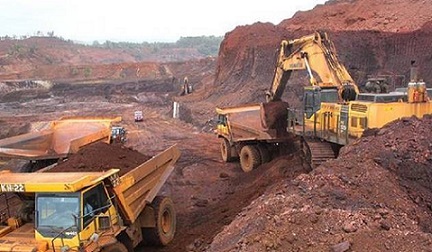By Our Business Bureau
SUKINDA/JAJPUR ROAD/BHUBANESWAR: Misrilall Mines Pvt Ltd runs into mess in Odisha’s Jajpur . Massive irregularities, corruption, illegal mining has hit the company’s state of affairs.
In June this year, Markets regulator SEBI has levied penalty of over Rs 20 lakh on Misrilall Mines Pvt Ltd for indulging in non-genuine and manipulative trades in the illiquid stock options segment of the BSE.
Misrilall Mines Pvt Ltd “by engaging in such non-genuine transactions, created a misleading impression of trading in respective contracts while dealing in stock options contracts in a fraudulent manner,” the regulator said in separate, but similarly worded orders. According to the orders, Misrilall Mines Pvt Ltd was fined Rs 20 lakh
After observing large scale reversal of trades in BSE’s stock options segment, the regulator conducted an investigation in the trading activity in illiquid stock options on the exchange from April 2014 to September 2015.
The chromite mines, namely Saruabil Chromite Mines is situated in Sukinda valley in Jajpur district of Odisha. The chromite ore area was taken over from the Maharaja of Keonjar and mining was started in the year 1950’s, under the name and style of our flagship company Misrilall Mines (P) Ltd. Since then the only thing that this group has been concentrating and developing upon, is backed by its vision —- The mining lease covers area of 246, 858 hectares of land.
Bids have been invited for Misrilall Mines’ Saruabil mine and B C Mohanty’s Kamarda mine, two of the three deposits lapsing in seventh months. On the other hand, Tata Steel’s Sukinda mine is being recommended for reservation for state-owned Industrial Development Corporation of Odisha.
India has 3-4 per cent of the world’s chrome ore reserves, 97 per cent of this lies in Odisha’s Sukinda valley. Along with the state-owned Orissa Mining Corporation (OMC), the three mines catered to 0.7 million tonne capacity of ferrochrome, or almost half the country’s 1.4 mt annual capacity. (Balasore Alloys, Indian Metals and Ferro Alloys and FACOR have captive mines with rights till 2030.)
The oldest Mishrilal Chromite Mines of Sukinda region operating since 1954 were closed three months back after the death of MD and owner of the mines Ashok Kumar Jain in April, 2013. Shiv Kumar Jain, the younger brother of Ashok, who was handling the trade and marketing wanted to be the owner of the mines.
Accordingly he had made a fake document that he was the MD and sole owner of the chromite mines which was opposed by his nephew and Ashok’s son Akshay. Akshay is residing in Chainbasa, Jharkhand. Several court cases are pending in the Kolkata High Court and several other courts pertaining to the property dispute, which has not been sorted out yet.
Due to the lingering dispute, the workers of the mines and plant were suffering a lot. Finally, the State Government stopped mining activity. Deputy Director of Mines of Jajpur Road had served a notice in this connection.
Notably, the mines are 17 km from Tomka express way. The company is having 610 acres lease area. A Grade chrome ore is produced from the mines and sold in China and other chemical plants in India. The company is also having a ferrochrome plant at Pankapal, Jajpur Road. More than 400 employees are working in the mines and chrome plant.
The studied silence of Naveen Patnaik led BJD Government in Odisha over illegal mining activities of Misrilall Mines Pvt Ltd, has raised many eyebrows. With Government extended lease period and mines auction on card by March 31,2010 and lease area extended by 10 square km to 58 square km, Misrilall Mines Pvt Ltd Mines missing no stone unturned to give a final touch to cover up its misdeeds in Jajpur-Keonjhar regions of Odisha.
The Justice MB Shah Panel in its report , had found large scale irregularities in Misrilall Mines Pvt Ltd, the Panel also recommended strong action against the Mining firm.
“Due to deforestation in various hills, 80 per cent of streams have gone dry. The water flow in Deogarha’s Padhanpata, Sundargarh’s Khandadhar and Keonjhar’s Sanaghagara and Badaghagara waterfalls has decreased by 50 per cent in last 10 years,” he informed.
“ The Government had earlier admitted that the water-flow in the Padhanpata waterfall at Deogarh had decreased drastically due to destruction of forests. But on the contrary, it showing favour to Misrilall Mines Pvt Ltd,” a local activist in Sukinda said.
Locals Sukind in Jajpur areas however expressed concerns over the dwindling of the wild animals and the increasing man-animal conflict in human habitations due to water and fodder scarcity in jungles and hills. “The residents of Sukinda will suffer acute water scarcity in near future due to illegal mining work of Misrilall Mines Pvt Ltd,”
The leases have been either granted or extended to the Misrilall Mines Pvt Ltd firms for mining iron ores without either any fresh evaluation or adopting the auction process. We sought directions for recovery of market value of the mined minerals in accordance with the law.
Meanwhile, several wildlife and social activists have sought a court-monitored probe into the extension of lease and allotment of the mineral mines for free of cost alleging that it had caused huge financial loss to the public via a concocted conspiracy.
“Within the principle upheld by the Supreme Court in its previous judgement, no natural assets can be allotted/extended free of cost. Impugned extension is contra to the law of the country. No where in the Act, it says to extend the lease free of cost. At least value of extension must be decided as per the maximum rate of auction value by the state or by another state government during these period,” they said.
They argued said that loss caused to the exchequer is liable to be recovered from the mining firms and their leases are liable to be quashed and the mines be put to fresh auction.They also demand quashing of section 8A of the MMDR (Mines and Minerals (Development and Regulation) Act.Section 8-A of the Act provides that all mining lease should be granted for a period of fifty years and on expiry of lease period, it should be put up for auction as per the procedure specified in the Act.
“We suspect that a large amount of political donation has been given by the corporate miner for the impugned provisions (of MMDR Act) for extension of the mining lease as free of cost from escaping auction process which is also a subject matter for CBI investigation and calling list of mines from all states for further action,” they said.
According to official sources , all old lease of the minerals mining, except coal block, has been extended for further 5 to 20 years under the garb of the amendment of 2015 without charging any cost/ premium and fresh value to pay for mining while new mines has been put up for auction which were auctioned for 80 per cent to 110 per cent premium other then royalty .
However, these Mines, who have, have argued against the commission’s report which they claimed have accused them of violating relevant provisions of the Environment Protection Act and extracting minerals without the requisite green clearance.
The quantity of ore that is to be extracted every year specified in the mining plan which is approved by IBM. Forest and environment laws have been violated installing screening plants without statutory clearance. No action has been taken by any of department state and center excess mining of the specified limit violating operating conditions, assessing impact on the local environment, grabbing unauthorised forest land.
94 of the 192 iron ore mining leases in Odisha do not have the mandatory environmental clearances. And of the 96 that have them, 75 have mined far beyond their permitted levels over the past several years, says the Justice M.B. Shah Commission report.
The exhaustive five-volume report lays bare how the mines have continued to use a loophole in the law for years and flagrantly violate environmental and other norms to pump out iron at a time when international prices of the metal are booming.
The report says 56 mining leases operated close to identified wildlife areas without adequate protection to the animals. The mandatory forest clearances had not been obtained in several cases. Waterbodies in and around 55 mines have been polluted. Water has depleted in natural streams in some cases and forestland impacted adversely in several others. A mining-project within a 10-kilometre vicinity of a protected wildlife area requires mandatory clearance from the National Board of Wildlife, which too was not obtained in several cases.
It has recommended that the entire extraction in all cases, where leases are operated without mandatory environmental clearances, be treated as illegal and the market value — domestic or export — recovered from the defaulting miners.
With no political parties raising the issue of corruption and irregularities in Odisha during the campaigning for the last Lok Sabha polls and Assembly, apprehensions are being raised if culprits will ever be brought to book.Probes into Rs 3 lakh crore mining scam have slowed down in the last couple years, raising doubts about a tacit understanding among the leaders.
The CEC, in its interim report, had revealed that a large number of mines operated in Odisha after the expiry of mining lease period on the provision of deemed extension of mining lease as no decision was taken on application filed by the lease-holders for renewal of the leases.It found that at least 163 mining leases operated without the requisite approvals under the Forest Conservation Act, 1980; environmental clearances, Air and Water Act or approved mining plans.The CEC also found that out of the 596 mines, as many as 307 mines consisted of either wholly or partly forest areas.
The Odisha government, in its reply furnished to National Mines Tribunal (NMT) in 2013 had admitted the illegalities committing in mining activities and stated that it had slapped Rs 65,000 crore penalty on 196 mine owners who allegedly indulged in illegal and over-extraction of minerals, mainly iron ore. Challenging the state government’s decision to impose penalty, many mines owners have gone to the court.However, the state government’s lack of seriousness to pursue the case has resulted in a paltry recovery of the penalty.
This apart, company played a key role in Odisha mining scam and violated Mines and Minerals Act, Mines and Minerals Regulation Act of 1957’s section 21. The company involved in illegal mining, theft and transportation. The company has violated pollution control act of 1986, air pollution control act of 1981, water pollution control act of 1974 and forest rights act of 1980.
Companies were supposed to extract mining with clearance of air and water pollution control under various acts like Environment (Protection) Act, 1986 and consent to operate under the Water (PCP) Act, 1974 and Air (PCP) Act, 1981.
The firm has been violating forest and wildlife laws .The Company, which is also creating air and water pollution while defying orders of Odisha State Pollution Control Board and Union Forest and Environment Ministry. Action should have taken against the company under Forest Conservation Act, 1980 and Odisha Forest Act-1972 and Mines and Minerals Act. But instead , the company got extension to run its closed mines.
Company which operating without valid consent to operate should have been issued closure directions or will be prosecuted as per the provisions in Water (PCP) Act, 1974 and Air(PCP) Act, 1981.While granting “consent to operate”, it will be ensured that the proponent has obtained all other statutory clearances under Forest (Conservation) Act, 1980 and Environment (Protection) Act, 1986.The Company has no respect to labour laws, they said.






















